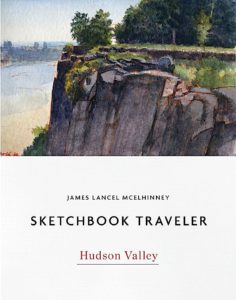The world we have known can never be the same. We can beguile ourselves with the vain hope that things will return to normal, forgetting that the world has always been in flux. Human evolution has been driven by geological upheaval, climate change and plagues. Mortal crises test us. For the first time in the history of the planet, a unique intelligent life-form has been focused on a single natural disaster, in real time, at the same moment in time.
Trying to make lemonade out of bitter fruit, these quotidian posts are offered as messages of hope, not just for our own survival, but as motivation to redirect our attention to the world around us, to treasure what we had previously taken for granted, drawing strength, wisdom and compassion from deeper engagements with nature.

POET’S WALK. Hudson Valley Sketchbook. July 7, 2011
(Image and text were featured in the exhibition James McElhinney. Discover the Hudson Anew, curated by Laura Vookles. Hudson River Museum. Yonkers, New York. September 13, 2019 to February 16, 2020.
Poets’ Walk, Annandale-on-Hudson, New York
Located on the left bank of the Hudson a few miles upstream from Kingston-Rhinecliff Bridge is a rolling tract of land that was developed as a private pleasure-park in 1849. Wealthy families having built estates atop the bluffs set aside a tract of uncultivated land for the enjoyment of nature and the improvement of health. They hired German landscape architect Hans Jacob Ehler to divide the land between clearings and woodlands, laying out trails, view-sheds and pavilions. Washington Irving, William Cullen Bryant and other notable recipients of Delano and Astor hospitality are said to have drawn inspiration from their rambles at Poets’ Walk. In recent years the park has come under the control of Scenic Hudson Land Trust, which maintains the trails and other amenities for year-round public use. Having visited the park on numerous occasions, I have never failed to meet other hikers on the trails without the exchange of pleasant greetings. Setting up to work from one of the wooden benches set out along the trails, or on the portable stool strapped to my back, I never suffered any kind of interruption or distraction. Perhaps visitors might slow their pace as they pass me, or steal a glance over my shoulder as they stride by. It seems that such places might promote civility, as much as they inspire bards.
(A preview of SKETCHBOOK TRAVELER by James L. McElhinney (c) 2020. Schiffer Publishing).
Copyright James Lancel McElhinney (c) 2020 Texts and images may be reproduced (with proper citation) by permission of the author. To enquire, send a request to editions@needlewatcher.com
